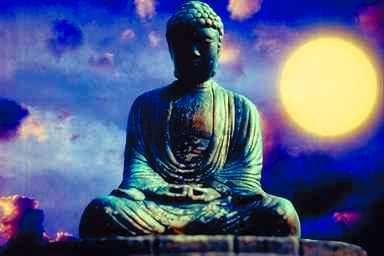
Non-Clinging: Letting Go of Attachments
The whole of the spiritual path may be summed up in the term non-clinging, because
through non-clinging love comes, through non-clinging the door to the Unconditioned
opens, our heart and our will purified and prepared to receive the Will of God.
The Buddha taught liberation through non-clinging: not clinging to anything
as me or mine, not grabbing something or pushing something else away. Most of
our human problems and all our difficulties in the spiritual path result from
clinging, from attachment. We take anger as me, as my anger, rather than simply
a feeling that will pass, that I can let go of. We take the desire for more
as my desire, to be acted upon, rather than as simply a thought or feeling that
will pass. We take all our thoughts and feeling reactions far too seriously,
as if we were just thoughts and reactions. When we cling to a thought, we become
that thought. On the road to freedom, we must let go of everything as me or
mine.
Non-attachment should not be confused with detachment, on the contrary non-attachment
is the antithesis of detachment. Through non-attachment we free ourselves to
love, to be wholly engaged in life, with family, friends, and profession. One
wonderful aspect of the practice of non-clinging is that partial results accrue
to us, even early in our path. If we learn not to identify with just a few kinds
of thoughts or emotional reactions, we discover a little freedom and lightness,
more joy as we walk through life. Non-clinging serves as its own reward.
If someone slights me, a whole train of thoughts and emotions may ensue and
persist for hours. If I am awake enough, at its beginning or even in the midst
of it, I see how I cling to the hurt feelings and thoughts. If through that
seeing, I am able and willing to release the grip of my reactions on me and
release my grip on them, then they subside on their own. I am left breathing
easier, unburdened and free to respond or not to the original situation. My
energies are conserved for better uses, such as joy and mindfulness. My will
is a little less caught in the habit of a self-reflexive stance, in creating
a false sense of myself as a person who was hurt by someone's slight.
Paraphrasing the Buddha, non-clinging is an invaluable practice at the beginning
of the path, in the middle of the path, and at the end of the path. The price
of admission to the spiritual depths, to the Unconditioned, to the presence
of God is to give up our clinging. The gate to the deep place only allows those
to pass through whose hearts are purified, at least temporarily. We might catch
a glimpse of the Divine though, if even for a moment we can relinquish all attachment,
all grabbing and all pushing away.
Because approaching the Divine requires complete non-clinging, life itself serves
as a strict and uncompromising taskmaster and teacher on our path. For example,
whenever anger arises in me and I identify with it, justifying to myself why
I should be angry, I need to notice this situation and let it go. This can be
very hard indeed, but very necessary if I am to free myself of clinging. This
is not to say that I shouldn't take appropriate action to defend myself. On
the contrary, we need to love and respect ourselves, as well as others. But
to respect ourselves is to let go of clinging to anger, to greed, to fear, to
wanting and not wanting. This is our situation and our difficulty, where we
must bear the true heavy-lifting of the spiritual practice of non-clinging,
a heavy-lifting which consists of relaxing, relaxing the ties than enmesh us
in mud, relaxing our attitude, releasing our grip on the lower to reach for
the higher.